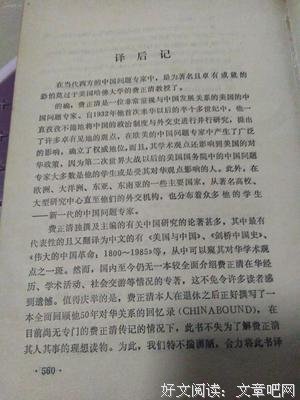《费正清对华回忆录》读后感1000字
《费正清对华回忆录》是一本由费正清著作,知识出版社出版的平装图书,本书定价:16.00元,页数:561,特精心从网络上整理的一些读者的读后感,希望对大家能有帮助。
《费正清对华回忆录》精选点评:
●翻开前以为会读到一个历经沧桑的老头谦逊的自白,顺便可以了解他的基本学术观点,就像其他在回忆录经常看到的那样。我想太多了。这老头虽然是中国权威,可美东常春藤式的自信傲慢到老都不变;光从回忆录来看,联络、演说、组织类别的工作比一般意义上的学术研究多一百倍;研究的虽然是近代历史,但非常懂得怎么影响主流政治决策......就像他自己说的“与其说我是研究中国历史的专家,不如说我是规划费正清事业的专家”。传教士般的热情让他乐在其中。怪不得黄仁宇在他这儿不招待见啊,完全是两种人生观。想搞学术的小伙伴们又一次被惊醒!
●为文笔赞
●费正清这人很幽默的,这本书很适合改编成电影,有爱情、有历史、有纵深、有八卦。
●信息量很大。费正清不愧是老江湖。原来除了臭名昭著的麦卡锡委员会外,还有个技高一筹的麦卡兰委员会
●删过
●a mirror, a model, a precedent
●推中国人民入地狱的老牲畜
●当人物稿看看
●從這本書,瞭解到學者的研究方法(訪談一手資料,並不代表就是有效力,還要經過篩選與驗證)與倫理(保持中立)是有多重要,否則研究出來的結果只會帶有私人情感而誤判情勢。
●翻译不好。
《费正清对华回忆录》读后感(一):翻译很差,我吐槽无力
翻译极差,翻了20页后不忍再读。不明白此书后来为什么没有重出译本。
读过的朋友肯定都感觉到痛苦了,没读过的就不必去读了,除非真的有什么特殊的需要。
豆瓣说我的评论太短了。。。
ORZ..............
字数补丁。。。。
翻译真的太差了。。。。。。
《费正清对华回忆录》读后感(二):一个学者的中美史
一本历史书一样的书,正好最近在看《光荣与梦想》,还在看热播的电视剧《平凡的世界》,历史总是那么的吸引人,哪怕你已经知道其中的故事结局是如何,历史比任何一本小说都更加出奇,没有哪个小说家能有历史这般的想象力。费正清在写本书时,语气很平淡,就是我们平时所说的平铺直叙,这正是面对历史的态度,历史不是《三国演义》,掺杂了很多情感和倾向,历史是《三国志》,没有爱憎分明,只有还原真实。但是又有一句话,一千个历史学家能写出一千种历史,哪怕所有的历史学家都站在专业的角度,拥有专业的素质,还是难免由于资料的特点、环境的限制等等因素,写出的历史肯定不是和真正的历史百分百一样。这也是我们读不同历史、回忆录的乐趣来源。
《费正清对华回忆录》读后感(三):大武生和费正清
过去只知道好电影大家都喜欢观看,现在还知道了好电影大家都能导。画家陈逸飞导演的电影没有看,至今仍然遗憾,据说女主角非常漂亮。高晓松导演的《大武生》就是一部非主流导演导的好看的电影,期待高晓松出狱后借电影大卖导出更好更多的电影,相信他可以做到。
一直以来都有这样的疑问在心头:京剧中的武生的功夫和武师的功夫究竟有什么样的区别?谁的功夫更好?《大武生》终于解开了长埋在心中多年的疙瘩,虽然没有完全解开,因为一个问题解决了,更多的问题又出来了。但是,有一点是清楚的:功夫是练出来的,台上一分钟,台下十年功。
《大武生》里的一句话给我的印象特别深:台上演真英雄,台下做真男儿。这倒很符合“求实”的主旋律,也符合高晓松的性情,所谓“文如其人”是也。只是今天不知有几人能够做到,近闻湖北省委巡视组在贫困地区挥霍公款就是最好的写照。台上台下戏里戏外真真假假虚虚实实,令人唏嘘。
“我逐渐对政治场上一般人物的品性形成一种极低的评价。我甚至幸运地认为,这些政客,与其说他们具有宗教狂热,不如说他们是没有什么道德的机会主义者。目前,这个国家甚至连推行法西斯主义的道德力量也没有了,因为人们那么长久以来一直在捞取所见到的每一根救命稻草,以至绝不再愿意让任何一根救命稻草从自己手中滑掉。道德力量在这里只表现为忍耐和固执,而非我们所说的勇敢,所以,就我们所面临的现状而论,再也没有比它更糟糕的了,而对开创新局面来说,又再也不会有如此千载难逢的良机了。”
看了电影《大武生》和近期的新闻,我不由得想起费正清于1943年11月9日在重庆写给华盛顿官方联系人的信中的一段话。
《费正清对华回忆录》读后感(四):A vivid description of modern China from an old friend
Fairbank, John King. 1982. Chinabound: A Fifty Year Memoir. New York: Harper & Row. [美]费正清着,陆惠勤等译:《费正清对华回忆录》,知识出版社,1991年。(Reading list 24)
John King Fairbank (费正清; 1907–1991), was a prominent American academic and historian of China. He was educated at Sioux Falls High School, Phillips Exeter Academy, the University of Wisconsin–Madison, Harvard College, and Oxford University (Balliol). The ambitious young scholar decided to go to Beijing to do research for his doctoral degree in 1932. In Beijing, he studied at Tsinghua University. Wilma Cannon (费慰梅) came to China to marry him and began a career of her own in Chinese art history. He returned to Harvard in 1936 to take up a position teaching Chinese history, Harvard's first full time specialist on that subject. He was among the China Hands who predicted the victory of Mao Zedong and advocated establishing relations with the new government. (Reference: Wikipedia)
This book is a fifty-year memoir written by John King Fairbank concerning his experience in China. It starts with the motive for the author’s decision to go to China, and closes with the end of China hands’ crisis, covering decades from 1907 to 1981. Different from those written by missionaries or individuals like Pearl Buck, this memoir is a vivid description of modern China which was struggling in revolutions; it also draws a picture of Chinese people and their foreign friends who participated in movements leading to China’s liberation.
There are two features of the memoir that deserve to be pointed out. Firstly, what makes Fairbank’s stories distinguishable from those “China hands” before him is that Fairbank was involved in his stories. He was not only an on-looker, but a witness or participant as well. In the context, Chinese readers can always come across some names that are familiar to them, such as Hu Shih, Lu Xun, Tsai Yuean-pei, Sun Yat-sen, etc., and under this circumstance, Chinese people no longer feel that they are being studied from a biological point of view as “another category”, but they are equal with others around the world and fighting persistently for a sacred cause.
econdly, one reason being that the history Fairbank wrote about is not far from today, his works seems to be more serious and practical than former sinologists. In the context, readers learn about infightings of various parties, their differentiated interests as well as their movements on the surface and more importantly, underground. Fairbank drew his conclusions from his experience in person, as a result of which his words are much more convincing than words by Arthur Smith or Pearl Buck, provided that the former came up with examples that seemed to be made up and the latter presented her ideas through a novel.
Overall, Fairbank’s work is valuable to Chinese people, either to be used as materials for modern Chinese history study, or to be read as a story told by an old friend of China. It should be admitted that Fairbank had done a good job as a sinologist, and a friend as well.
